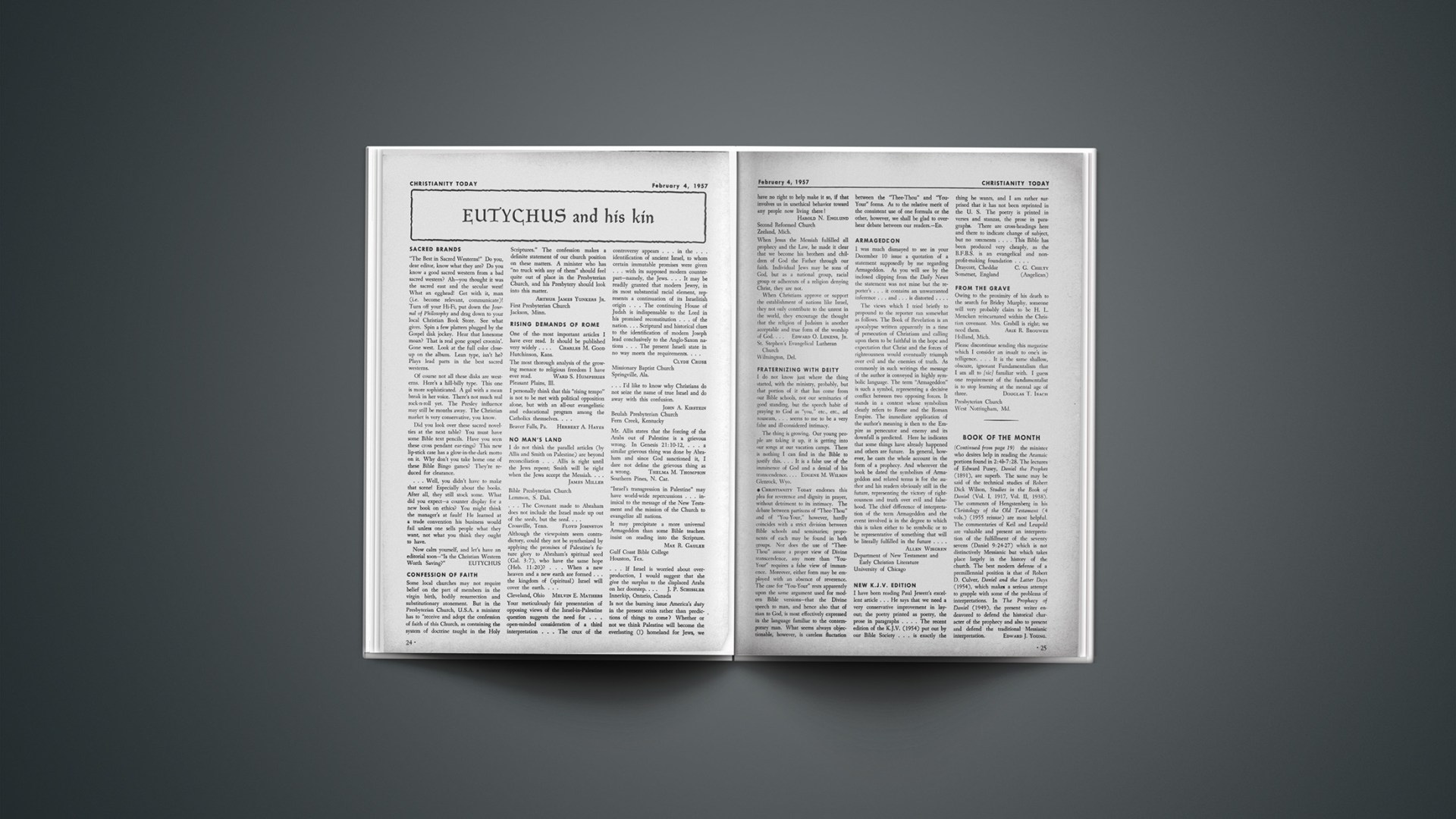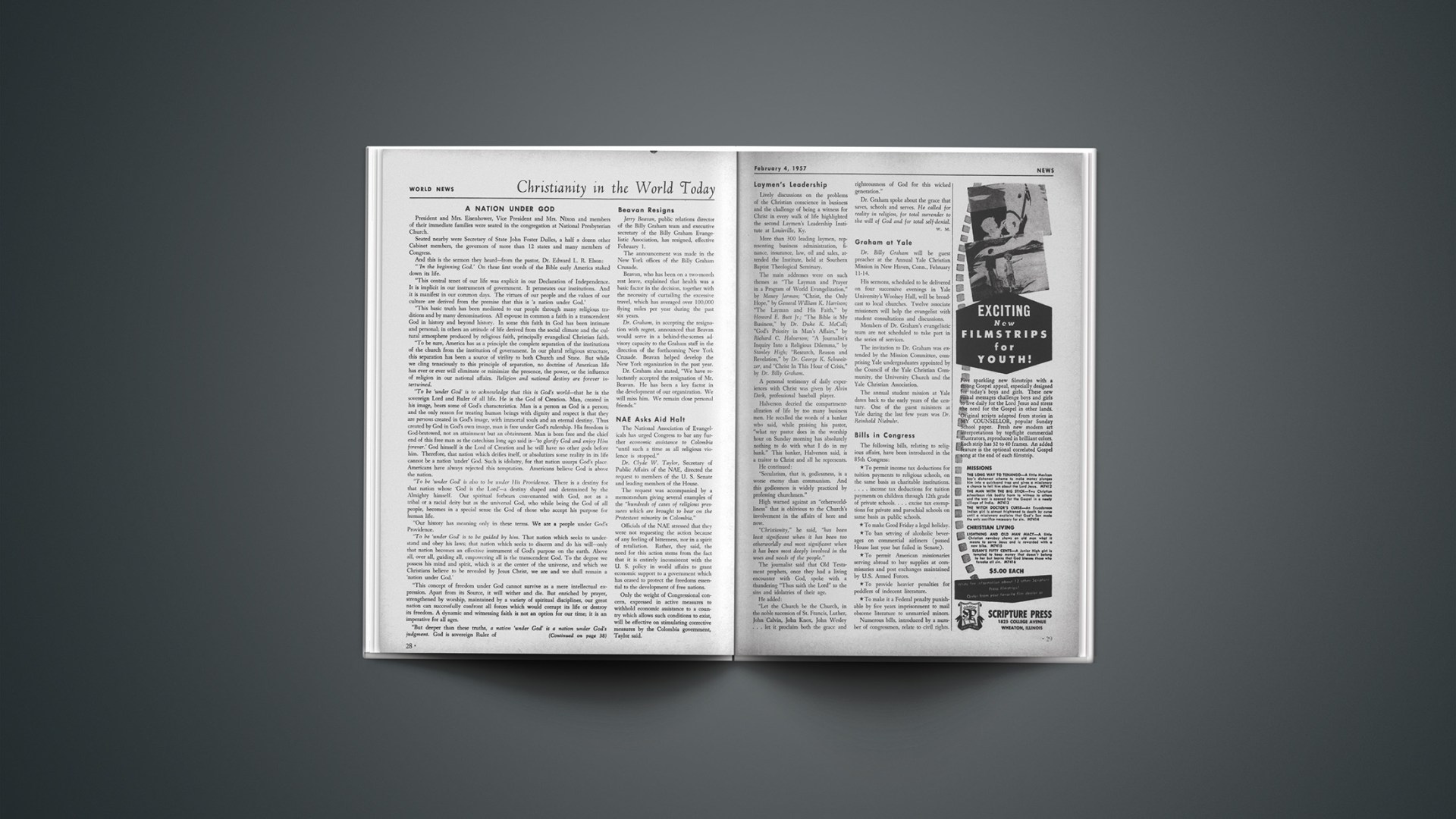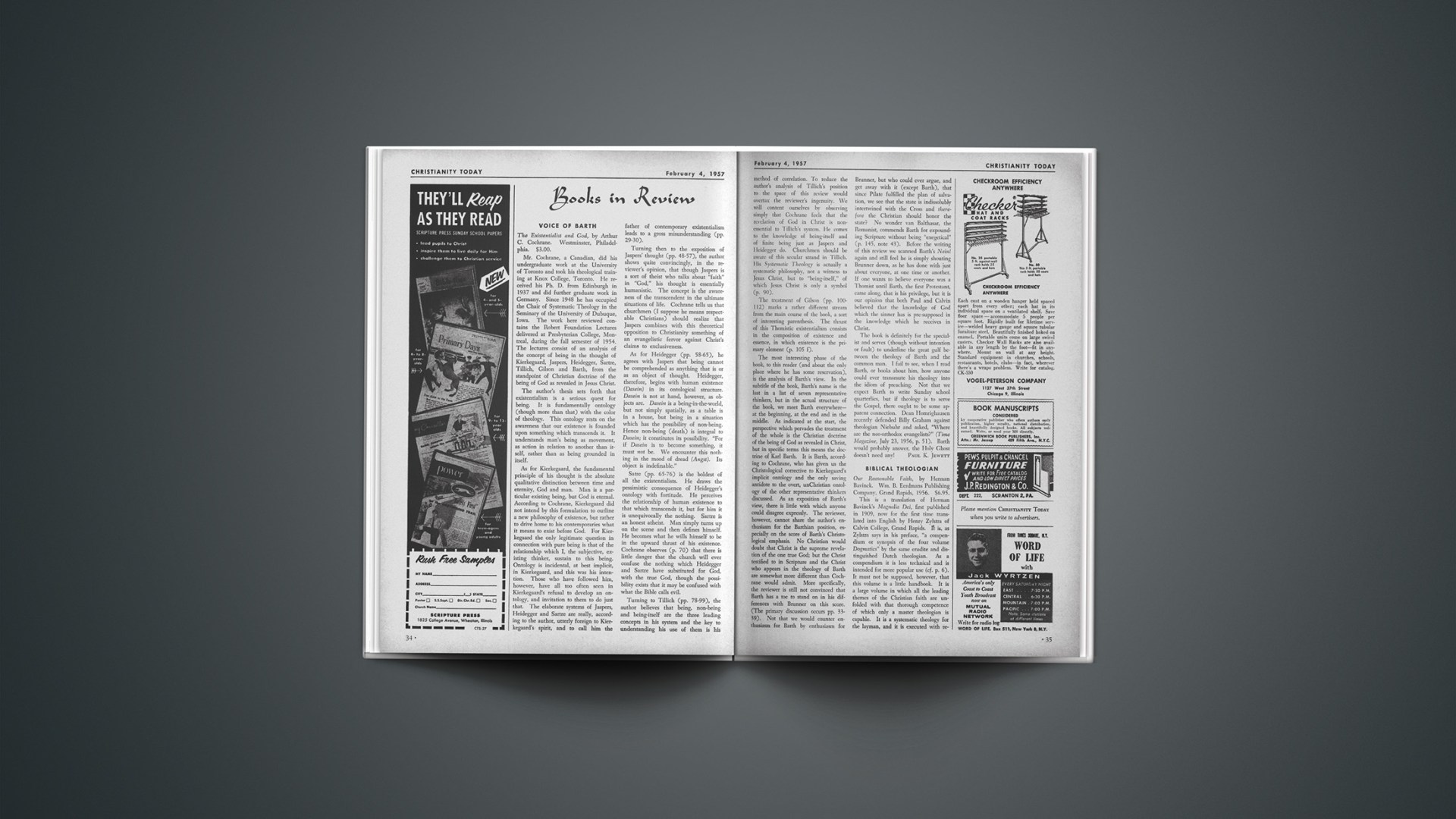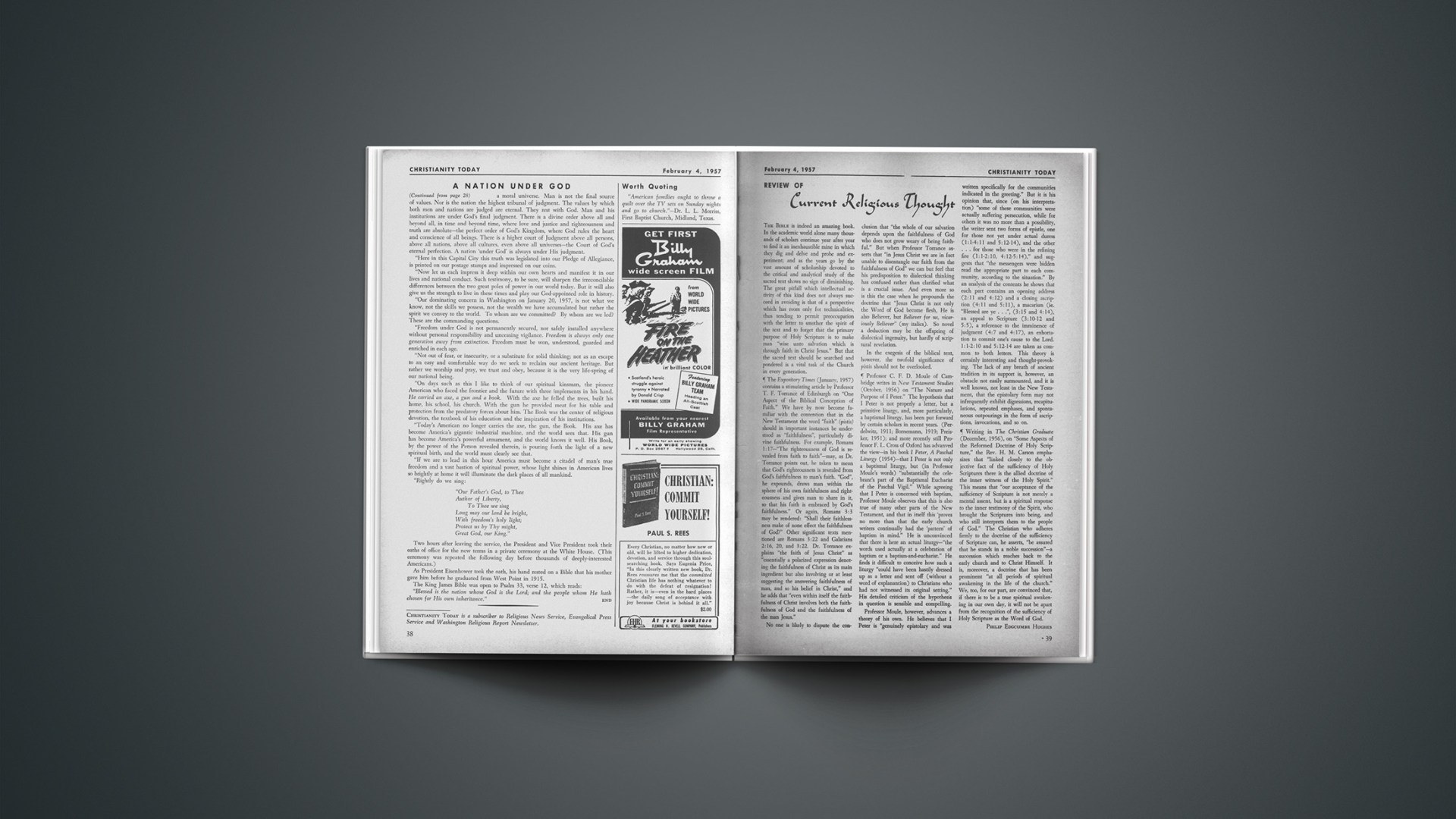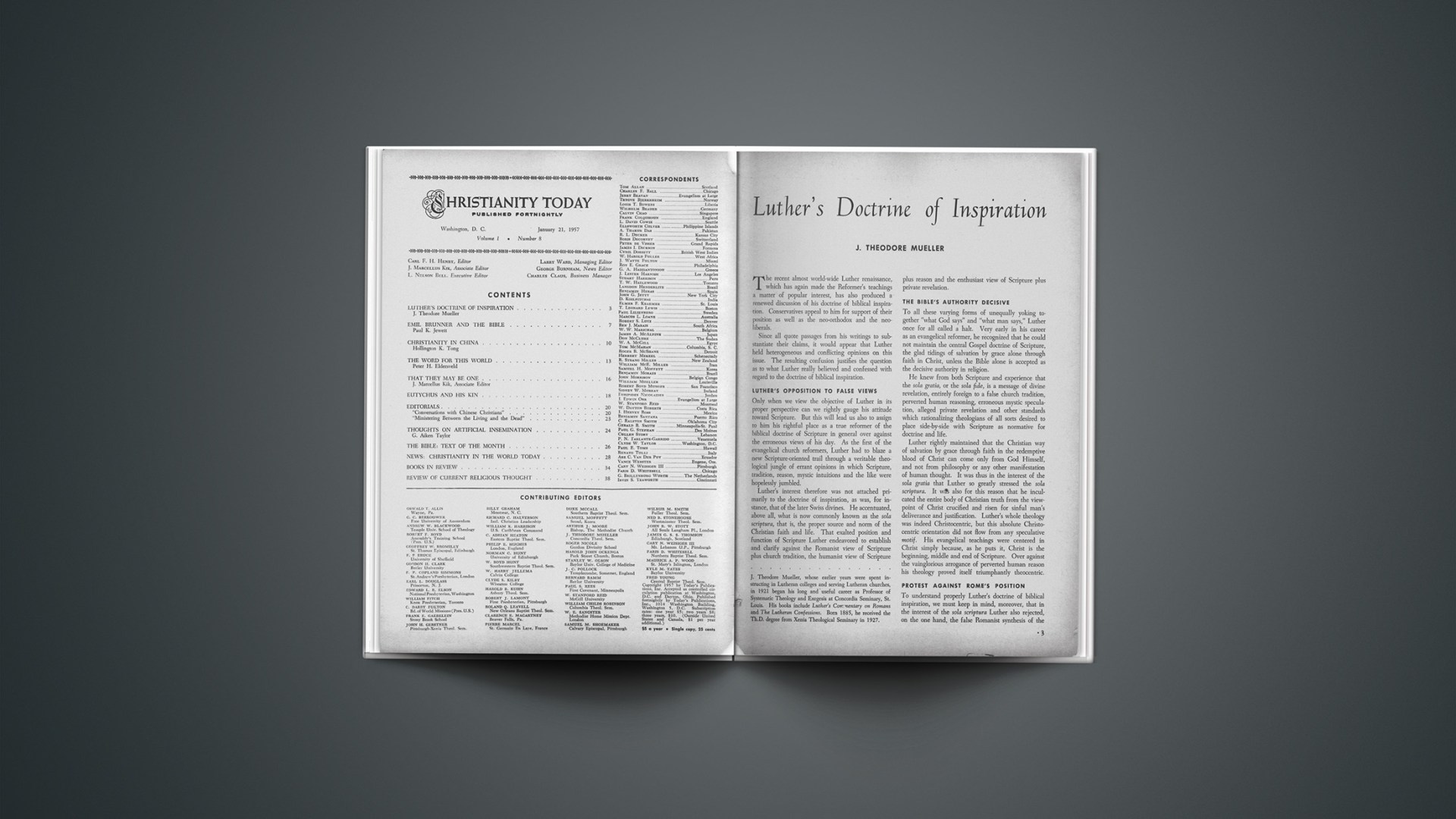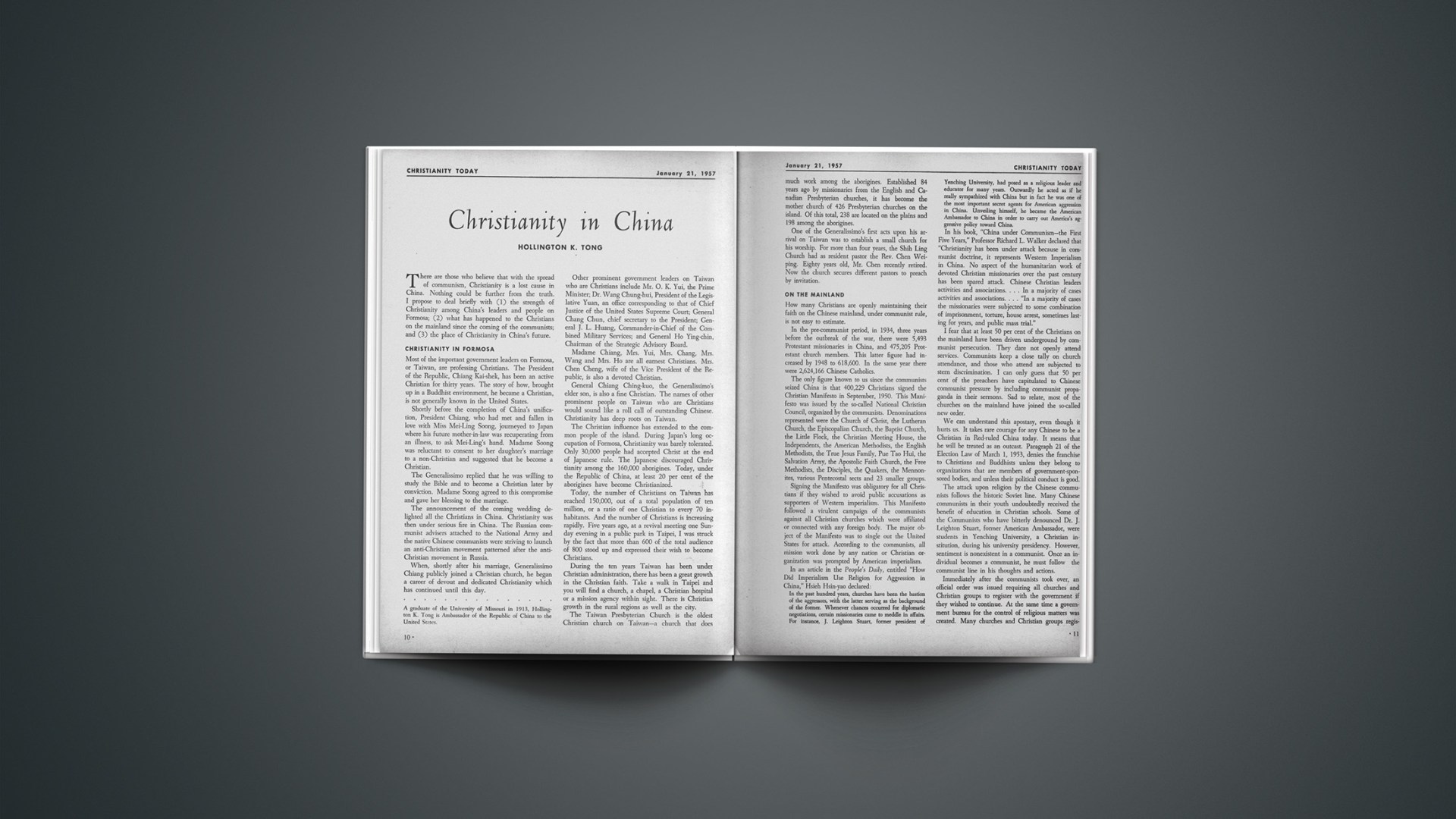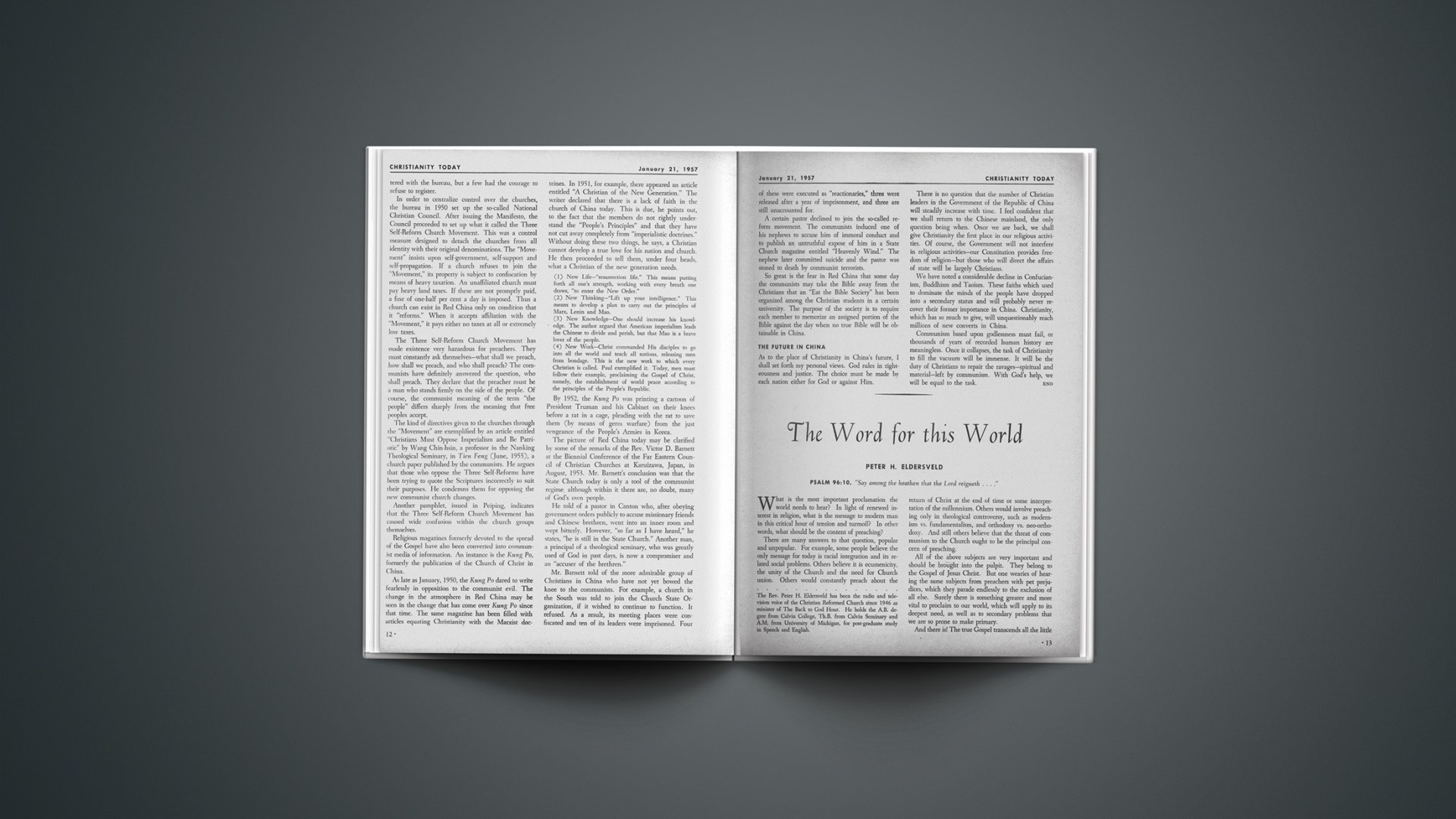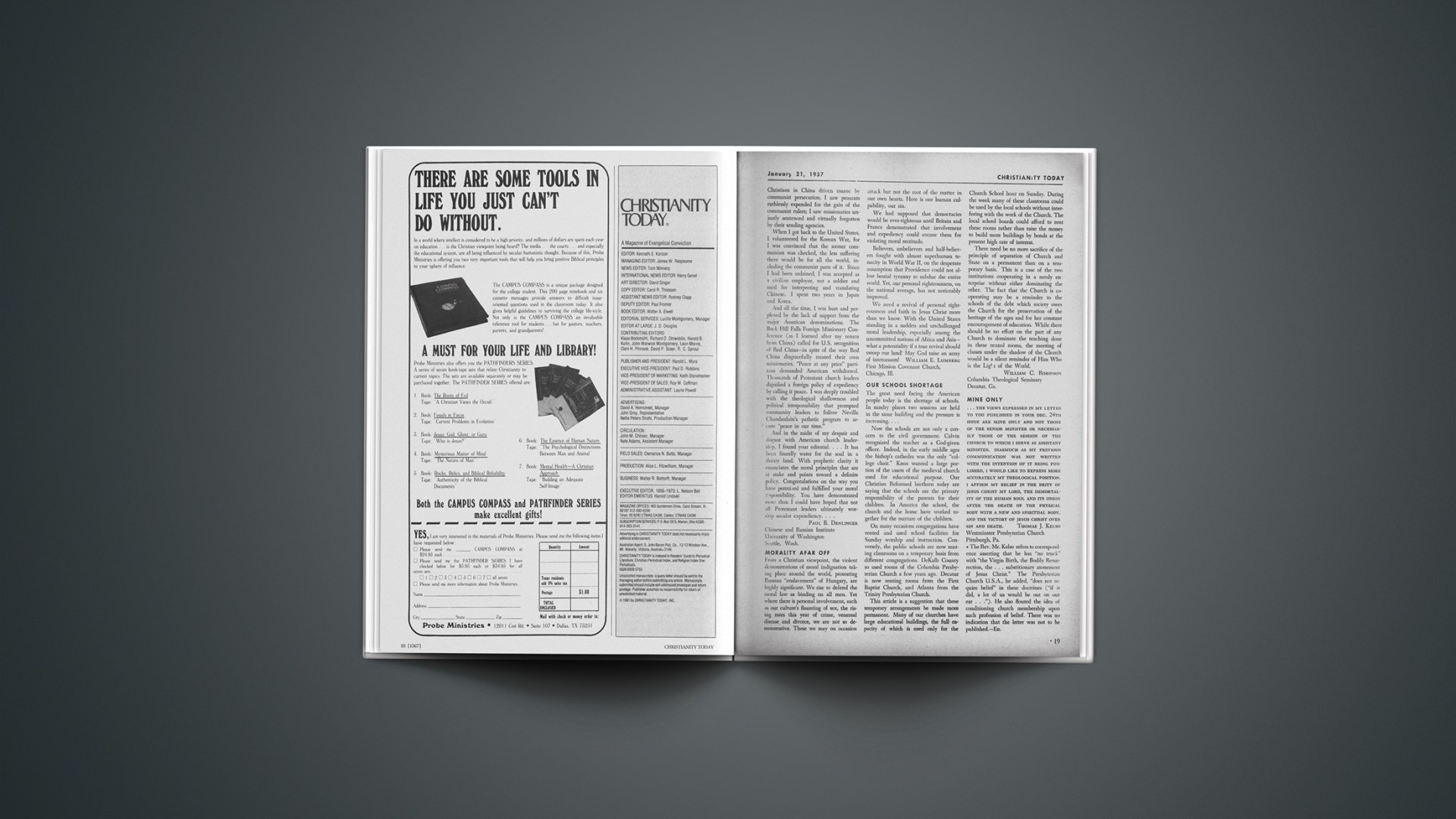SACRED BRANDS
“The Best in Sacred Westerns!” Do you, dear editor, know what they are? Do you know a good sacred western from a bad sacred western? Ah—you thought it was the sacred east and the secular west! What an egghead! Get with it, man (i.e. become relevant, communicate)! Turn off your Hi-Fi, put down the Journal of Philosophy and drag down to your local Christian Book Store. See what gives. Spin a few platters plugged by the Gospel disk jockey. Hear that lonesome moan? That is real gone gospel croonin’. Gone west. Look at the full color close-up on the album. Lean type, isn’t he? Plays lead parts in the best sacred westerns.
Of course not all these disks are westerns. Here’s a hill-billy type. This one is more sophisticated. A gal with a mean break in her voice. There’s not much real rock-n-roll yet. The Presley influence may still be months away. The Christian market is very conservative, you know.
Did you look over these sacred novelties at the next table? You must have some Bible text pencils. Have you seen these cross pendant ear-rings? This new lip-stick case has a glow-in-the-dark motto on it. Why don’t you take home one of these Bible Bingo games? They’re reduced for clearance.
… Well, you didn’t have to make that scene! Especially about the books. After all, they still stock some. What did you expect—a counter display for a new book on ethics? You might think the manager’s at fault! He learned at a trade convention his business would fail unless one sells people what they want, not what you think they ought to have.
Now calm yourself, and let’s have an editorial soon—“Is the Christian Western Worth Saving?”
EUTYCHUS
CONFESSION OF FAITH
Some local churches may not require belief on the part of members in the virgin birth, bodily resurrection and substitutionary atonement. But in the Presbyterian Church, U.S.A. a minister has to “receive and adopt the confession of faith of this Church, as containing the system of doctrine taught in the Holy Scriptures.” The confession makes a definite statement of our church position on these matters. A minister who has “no truck with any of them” should feel quite out of place in the Presbyterian Church, and his Presbytery should look into this matter.
ARTHUR JAMES YUNKEHS JR.
First Presbyterian Church
Jackson, Minn.
RISING DEMANDS OF ROME
One of the most important articles I have ever read. It should be published very widely.…
CHARLES M. GOOD
Hutchinson, Kans.
The most thorough analysis of the growing menace to religious freedom I have ever read.
WARD S. HUMPHRIES
Pleasant Plains, Il.
I personally think that this “rising tempo” is not to be met with political opposition alone, but with an all-out evangelistic and educational program among the Catholics themselves.…
HERBERT A. HAYES
Beaver Falls, Pa.
NO MAN’S LAND
I do not think the parallel articles (by Allis and Smith on Palestine) are beyond reconciliation … Allis is right until the Jews repent; Smith will be right when the Jews accept the Messiah.…
JAMES MILLER
Bible Presbyterian Church
Lemmon, S. Dak.
… The Covenant made to Abraham does not include the Israel made up out of the seeds, but the seed.…
FLOYD JOHNSTON
Crossville, Tenn.
Although the viewpoints seem contradictory, could they not be synthesized by applying the promises of Palestine’s future glory to Abraham’s spiritual seed (Gal. 3:7), who have the same hope (Heb. 11:20)?… When a new heaven and a new earth are formed … the kingdom of (spiritual) Israel will cover the earth.…
MELVIN E. MATHERS
Cleveland, Ohio
Your meticulously fair presentation of opposing views of the Israel-in-Palestine question suggests the need for … open-minded consideration of a third interpretation … The crux of the
controversy appears … in the … identification of ancient Israel, to whom certain immutable promises were given … with its supposed modern counterpart—namely, the Jews.… It may be readily granted that modern Jewry, in its most substantial racial element, represents a continuation of its Israelitish origin … The continuing House of Judah is indispensable to the Lord in his promised reconstitution … of the nation.… Scriptural and historical clues to the identification of modern Joseph lead conclusively to the Anglo-Saxon nations … The present Israeli state in no way meets the requirements.…
CLYDE CRUSE
Missionary Baptist Church
Springville, Ala.
… I’d like to know why Christians do not seize the name of true Israel and do away with this confusion.
JOHN A. KIRSTEIN
Beulah Presbyterian Church
Fern Creek, Kentucky
Mr. Allis states that the forcing of the Arabs out of Palestine is a grievous wrong. In Genesis 21:10–12, … a similar grievous thing was done by Abraham and since God sanctioned it, Idare not define the grievous thing as a wrong.
THELMA M. THOMPSON
Southern Pines, N. Car.
“Israel’s transgression in Palestine” may have world-wide repercussions … inimical to the message of the New Testament and the mission of the Church to evangelize all nations.
It may precipitate a more universal Armageddon than some Bible teachers insist on reading into the Scripture.
MAX R. GAULKE
Gulf Coast Bible College
Houston, Tex.
… If Israel is worried about overproduction, I would suggest that she give the surplus to the displaced Arabs on her doorstep.…
J. P. SCHISSLER
Innerkip, Ontario, Canada
Is not the burning issue America’s duty in the present crisis rather than predictions of things to come? Whether or not we think Palestine will become the everlasting (!) homeland for Jews, we have no right to help make it so, if that involves us in unethical behavior toward any people now living there!
HAROLD N. ENGLUND
Second Reformed Church
Zeeland, Mich.
When Jesus the Messiah fulfilled all prophecy and the Law, he made it clear that we become his brothers and children of God the Father through our faith. Individual Jews may be sons of God, but as a national group, racial group or adherents of a religion denying Christ, they are not.
When Christians approve or support the establishment of nations like Israel, they not only contribute to the unrest in the world, they encourage the thought that the religion of Judaism is another acceptable and true form of the worship of God.…
Edward O. Lukens, Jr.
St. Stephen’s Evangelical Lutheran Church
Wilmington, Del.
FRATERNIZING WITH DEITY
I do not know just where the thing started, with the ministry, probably, but that portion of it that has come from our Bible schools, not our seminaries of good standing, but the speech habit of praying to God as “you,” etc., etc., ad nauseam, … seems to me to be a very false and ill-considered intimacy.
The thing is growing. Our young people are taking it up, it is getting into our songs at our vacation camps. There is nothing I can find in the Bible to justify this.… It is a false use of the imminence of God and a denial of his transcendence.…
EUGENE M. WILSON
Glenrock, Wyo.
• Christianity Today endorses this plea for reverence and dignity in prayer, without detriment to its intimacy. The debate between partisans of “Thee-Thou” and of “You-Your,” however, hardly coincides with a strict division between Bible schools and seminaries; proponents of each may be found in both groups. Nor does the use of “Thee-Thou” assure a proper view of Divine transcendence, any more than “You-Your” requires a false view of immanence. Moreover, either form may be employed with an absence of reverence. The case for “You-Your” rests apparently upon the same argument used for modern Bible versions—that the Divine speech to man, and hence also that of man to God, is most effectively expressed in the language familiar to the contemporary man. What seems always objectionable, however, is careless fluctuation between the “Thee-Thou” and “You-Your” forms. As to the relative merit of the consistent use of one formula or the other, however, we shall be glad to overhear debate between our readers.—ED.
ARMAGEDDON
I was much dismayed to see in your December 10 issue a quotation of a statement supposedly by me regarding Armageddon. As you will see by the inclosed clipping from the Daily News the statement was not mine but the reporter’s … it contains an unwarranted inference … and … is distorted.…
The views which I tried briefly to propound to the reporter ran somewhat as follows. The Book of Revelation is an apocalypse written apparently in a time of persecution of Christians and calling upon them to be faithful in the hope and expectation that Christ and the forces of righteousness would eventually triumph over evil and the enemies of truth. As commonly in such writings the message of the author is conveyed in highly symbolic language. The term “Armageddon” is such a symbol, representing a decisive conflict between two opposing forces. It stands in a context whose symbolism clearly refers to Rome and the Roman Empire. The immediate application of the author’s meaning is then to the Empire as persecutor and enemy and its downfall is predicted. Here he indicates that some things have already happened and others are future. In general, however, he casts the whole account in the form of a prophecy. And wherever the book be dated the symbolism of Armageddon and related terms is for the author and his readers obviously still in the future, representing the victory of righteousness and truth over evil and falsehood. The chief difference of interpretation of the term Armageddon and the event involved is in the degree to which this is taken either to be symbolic or to be representative of something that will be literally fulfilled in the future.…
ALLEN WIKGREN
Department of New Testament and Early Christian Literature
University of Chicago
NEW K.J.V. EDITION
I have been reading Paul Jewett’s excellent article … He says that we need a very conservative improvement in layout; the poetry printed as poetry, the prose in paragraphs.… The recent edition of the K.J.V. (1954) put out by our Bible Society … is exactly the thing he wants, and I am rather surprised that it has not been reprinted in the U. S. The poetry is printed in verses and stanzas, the prose in paragraphs. There are cross-headings here and there to indicate change of subject, but no comments.… This Bible has been produced very cheaply, as the B.F.B.S. is an evangelical and non-profit-making foundation.…
C. G. Chilty
(Angelican)
Draycott, Cheddar
Somerset, England
FROM THE GRAVE
Owing to the proximity of his death to the search for Bridey Murphy, someone will very probably claim to be H. L. Mencken reincarnated within the Christian covenant. Mrs. Grabill is right; we need them.
Arie R. Brouwer
Holland, Mich.
Please discontinue sending this magazine which I consider an insult to one’s intelligence.… It is the same shallow, obscure, ignorant Fundamentalism that I am all to [sic] familiar with. I guess one requirement of the fundamentalist is to stop learning at the mental age of three.
Douglas T. Ibach
Presbyterian Church
West Nottingham, Md.

